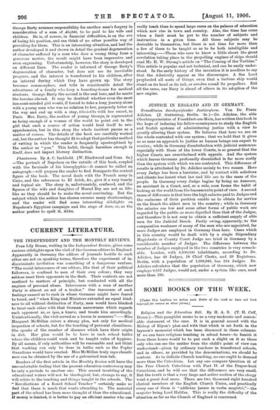C URRENT LITE RA T (IRE.
THE INDEPENDENT AND THE MONTHLY REVIEWS.
Fran Lily Braun, writing in the Independent Review, gives some curious sidelights upon the visit of the German editors to England. Apparently in Germany the editors of journals hostile to each other are not on speaking terms, therefore the experiment of in- discriminate invitation was something of a dangerous venture. "The social intercourse of our editors, like that of their political followers, is confined to men of their own colour; they very seldom meet their opponents in the flesh. Their contests are not confined to matters of principle, but conducted with all the engines of personal abuse. Intercourse with a man of another Party is almost an act of a traitor." Our innocence of such• feelings caused us to rush in where Germans might have feared to tread, and "when King and Ministers extended an equal kind- ness to all without distinction of Party, men would have blushed to treat each other with that German narrowness which regards each opponent as, eo ipso, a knave, and treats him accordingly. Unintentionally, the visit served as a lesson in manners."—Miss Margaret McMillan enters a strong plea, not only for medical inspection of schools, but for the teaching of personal cleanliness. She speaks of the number of diseases which have their origin in dirt. Her plan would be to have in each school baths where the children could wash and be taught rules of hygiene. By all means, if only authorities will be reasonable and not think that washing can only be done in baths such as the Poplar Guardians would have erected. Miss McMillan truly says cleanli- ness can be obtained by the use of a galvanised iron tub.
Readers of the first article in the Monthly Review will have the uncomfortable feeling that the present education controversy may be only a prelude to another one. This second troubling of the educational waters will not be theological, but, strange to say, it will relate to the teaching and things taught in the schools. The "Recollections of a Board School Teacher certainly make us feel that there is much that wants attending to. The material part of the school has been more thought of than the educational. If money is limited, it is better to pay an efficieut master who can
really teach than to spend large sums on the palaces of education which now rise in town and country. Also, the time has come when a limit must be put to the number of subjects and instruction in a given time. All these subjects may be desirable in themselves, but there is not time for more than a few of them to be taught so as to. be both intelligible and interesting.—Those who care to know a little about the great revolution taking place in the propelling engines of ships should read Mr. H. W. Strong's article on "The Coming of the Turbine." This article is popular and not technical, and can be easily under- stood. In the early history of the invention it is needless to say that the Admiralty appear as the discourager. A Sea Lord prophesied all sorts of things, even that a turbine ship would stand on its head or its tail, or revolve round its propellers. But all the same, our Navy is ahead of others in its adoption of the new engine.


































 Previous page
Previous page